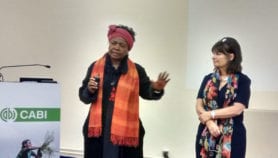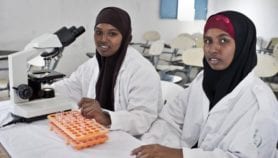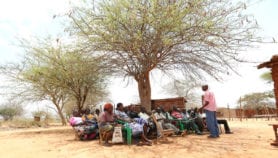By: David Dickson
Send to a friend
The details you provide on this page will not be used to send unsolicited email, and will not be sold to a 3rd party. See privacy policy.
[NEW DELHI] An Egyptian-born scientist who trained in the United States and later won the Nobel Prize for chemistry has warned that excessive bureaucracy is stifling the growth of science in many developing countries.
The warning has come from Ahmed Zewail, professor of physics at the Californian Institute of Technology, who won the Nobel Prize in 1999 for his work on the use of ultra-fast lasers to study the internal dynamics of atoms.
In an address to members of the Third World Academy of Sciences, meeting in New Delhi, India, Zewail said that it was time for developing countries to “put their own house in order” if they wanted to reap the benefits that modern science and technology have to offer.
The developed world could help in many ways, for example by providing extra resources to support science through its aid programmes. “But we cannot simply wait and blame the developed world for everything,” said Zewail.
One important need, he said, is to develop a much more critical approach to science education. The way that science is currently taught in many developing countries is “not good enough in the world of today”, and a “major rethinking” of science education is required in many parts of the world.
For example, being required to absorb large amounts of information from books “is not the way to the future” said Zewail. Science education needs to be "hands on", and the task of teachers is “to open the minds of young people”, not just to fill them with facts.
Another major barrier to the development of science in many parts of the developing world are the limitations currently imposed on the effective use of human resources. “There are tremendous resources in many parts of the world, as I have myself seen in countries such as China, India and Egypt,” Zewail said. “It is a question of making the best possible use of such resources.”
One way of achieving this is to ensure the implementation of systems of promotion based on merit. “I am very disturbed when I go to many parts of the developing world and find promotion systems still based primarily on age and seniority,” said Zewail, contrasting this to the environment in the United States in which he had flourished.
Bureaucracy was another, related, problem. “Everything is centralised; everything needs approval. If there is one thing that I have witnessed in many of my travels in developing countries, it has been the enormous bureaucracy."
There were murmurs of approval in the audience when Zewail added: “You all know how many signatures you need to attend a conference outside your own country.” The question of excessive bureaucracy was, he said, “very serious — if we want to do something about it, we have to be very frank.”
© SciDev.Net 2002
More on Networks

Script media release
Journalists offered ‘big break’ mentoring opportunity from Radio Nigeria
03/04/19












